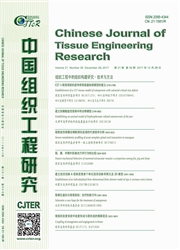

 中文摘要:
中文摘要:
微囊是指直径在200~1500μm的球形生物相容性半透膜,这种膜允许营养物质、氧气、细胞分泌的产物及废弃物双向通过,却能阻止大分子物质如抗体和免疫活性细胞通过.体内原位注射微囊化的肿瘤细胞在细胞生长、模拟体内细胞生长环境、制造原位肿瘤模型、器官转移模型等方面相对于体外单层细胞、团块状细胞培养,体内原位、远端器官肿瘤细胞注射及肿瘤组织种植,都有无可比拟的优势.微囊化人肿瘤细胞可广泛用于抗肿瘤药物的筛选、疗效评估等.本文对微囊化人肿瘤细胞的优点及应用前景作一综述.
 英文摘要:
英文摘要:
A microcapsule is a spherical, with a diameter that can be controlled in the range of 200 -1500 μm and biocompatible semipermeable membrane, which allows the bidirectional diffusion of nutrients,oxygen, secreted therapeutic product, and waste but prevents the penetration of high molecular weight substances from the microcapsule, such as antibodies and immunocytes. In comparison to monolayer culture and multicellular tumor spheroid model, orthotopic injection of microencapsulated tumor cells has uncomparable advantages in cell proliferation, mimicking the in vivo situation, making orthotopic tumor model and distant organ metastases model. Microencapsulated tumor assay has the potential of being widely used for in vitro anticancer drug screening and evaluation of the effects. This article mainly reviews the advantages of microencapsulated tumor assay and its application.
 同期刊论文项目
同期刊论文项目
 同项目期刊论文
同项目期刊论文
 A Preliminary Study of Alginate, Heparin–Chitosan- Alginate, Heparin Microencapsulated Hepatocytes S
A Preliminary Study of Alginate, Heparin–Chitosan- Alginate, Heparin Microencapsulated Hepatocytes S pH-responsive protein microcapsules fabricated via glutaraldehyde mediated covalent layer-by-layer a
pH-responsive protein microcapsules fabricated via glutaraldehyde mediated covalent layer-by-layer a Biomimetic modification of chitosan with covalently grafted lactose and blended heparin for improvem
Biomimetic modification of chitosan with covalently grafted lactose and blended heparin for improvem Gelatin/chitosan/hyaluronan ternary complex scaffold containing basic fibroblast growth factor for c
Gelatin/chitosan/hyaluronan ternary complex scaffold containing basic fibroblast growth factor for c The influence of polycaprolactone coating on the internalization and cytotoxicity of gold nanopartic
The influence of polycaprolactone coating on the internalization and cytotoxicity of gold nanopartic Incorporation of Basic Fibroblast Growth Factor by a Layer-by-Layer Assembly Technique to Produce Bi
Incorporation of Basic Fibroblast Growth Factor by a Layer-by-Layer Assembly Technique to Produce Bi Selective removal of particle cores to fabricate manganese carbonate hollow spheres and composite mi
Selective removal of particle cores to fabricate manganese carbonate hollow spheres and composite mi Equilibrium Distribution of Permeants in Polyelectrolyte Microcapsules Filled with Negatively Charge
Equilibrium Distribution of Permeants in Polyelectrolyte Microcapsules Filled with Negatively Charge Assembly of polymeric micelles into hollow microcapsules with extraordinary stability against extrem
Assembly of polymeric micelles into hollow microcapsules with extraordinary stability against extrem Influence of Drying Time of Polyelectrolyte Multilayers on the Compression-Induced Pattern Formation
Influence of Drying Time of Polyelectrolyte Multilayers on the Compression-Induced Pattern Formation Direct Covalent Assembly to Fabricate Microcapsules with Ultrathin Walls and High Mechanical Strengt
Direct Covalent Assembly to Fabricate Microcapsules with Ultrathin Walls and High Mechanical Strengt Template Polymerization to Fabricate Hydrogen-Bonded Poly(acrylic acid)/Poly(vinylpyrrolidone) Hollo
Template Polymerization to Fabricate Hydrogen-Bonded Poly(acrylic acid)/Poly(vinylpyrrolidone) Hollo Polyelectrolyte microcapsules templated on poly(styrene sulfonate)-doped CaCO3 particles for loading
Polyelectrolyte microcapsules templated on poly(styrene sulfonate)-doped CaCO3 particles for loading Thermosensitive poly(allylamine)-g-poly(N-isopropylacrylamide) copolymers: Salt-tuned phase separati
Thermosensitive poly(allylamine)-g-poly(N-isopropylacrylamide) copolymers: Salt-tuned phase separati Compression-Inhibited Pore Formation of Polyelectrolyte Multilayers Containing Weak Polyanions: A Sc
Compression-Inhibited Pore Formation of Polyelectrolyte Multilayers Containing Weak Polyanions: A Sc Biologically Driven Assembly of Polyelectrolyte Microcapsule Patterns To Fabricate Microreactor Arra
Biologically Driven Assembly of Polyelectrolyte Microcapsule Patterns To Fabricate Microreactor Arra Polylactide hollow spheres fabricated by interfacial polymerization in an oil-in-water emulsion syst
Polylactide hollow spheres fabricated by interfacial polymerization in an oil-in-water emulsion syst Single Polyelectrolyte Microcapsules Fabricated By Glutaraldehyde-Mediated Covalent Layer-By-Layer A
Single Polyelectrolyte Microcapsules Fabricated By Glutaraldehyde-Mediated Covalent Layer-By-Layer A Two-dimensional chemically tunable patterns with cellular structures fabricated via thermal pressing
Two-dimensional chemically tunable patterns with cellular structures fabricated via thermal pressing Robust poly(allylamine)-graft-poly(Nisopropylacrylamide) particles prepared by physical crosslinking
Robust poly(allylamine)-graft-poly(Nisopropylacrylamide) particles prepared by physical crosslinking Multilayer Capsules with Cell-like Topology: Fabrication and Spontaneous Loading of Various Substanc
Multilayer Capsules with Cell-like Topology: Fabrication and Spontaneous Loading of Various Substanc 期刊信息
期刊信息
